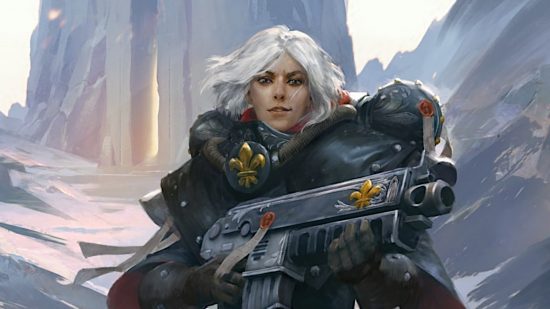Our Verdict
Warhammer 40k: Rogue Trader's adventure across the dangerous Koronus Expanse is full of fun sci-fi lore and companions, but it’s buried beneath wonky balancing, tedious spaceship battles, and quest-breaking bugs. Perhaps after numerous patches, Rogue Trader will one day become a strong addition to the CRPG genre.
Developer Owlcat Games is no stranger to isometric role-playing games or CRPGs. We’re in a renaissance era for them right now, starting from Pillars of Eternity in 2015 through to 2023 game-of-the-year frontrunner Baldur’s Gate 3. Owlcat Games’ other contributions to this revival include Pathfinder: Kingmaker and Pathfinder: Wrath of the Righteous. Both games were well received but not without their problems, which brings us to Warhammer 40k: Rogue Trader – the team’s latest and most ambitious CRPG to date.
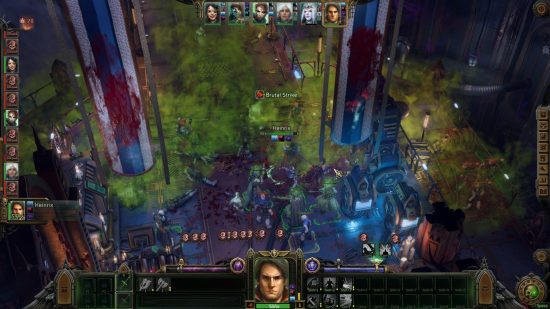
As a massive RPG fan and a casual enjoyer of Warhammer-related experiences, I was excited for Rogue Trader. A wonderfully detailed character creator greets me with portraits, homeworlds, origins, archetypes, characteristics, ship names, and more to select. As I like to play characters that have utility both in conversation and combat, I opt for the Officer archetype with the Noble origin, giving me a bonus in the Fellowship characteristic, which will hopefully allow me to support allies and persuade the denizens of the Koronus Expanse not to blow my head clean off. Companions quickly fill the three other starting archetypes (Warrior, Soldier, and Operative), and it isn’t long before I’m taking doubles of each with me into combat, as the party limit is six.
Rogue Trader begins with me aboard the ship I named In Amber Clad (and if you get that reference, we should be friends), where I learn I am a potential successor to the von Valancius Rogue Trader title. I also learn that Rogue Traders aren’t dastardly merchants as the title implies but rather captains of massive ships and lords over entire star systems. What’s more, they have the God Emperor’s mandate to do more or less as they please while venturing into the unexplored Koronus Expanse.
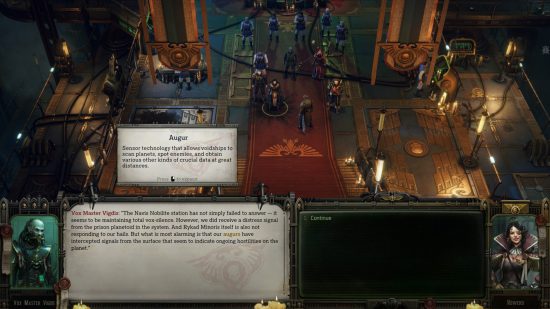
Like any good CRPG, disaster soon strikes, and I find myself assuming the von Valancius Rogue Trader title. I’ve watched a handful of Warhammer 40k tabletop bouts at my local tabletop role-playing store years ago and spent a more recent summer playing too much Blood Bowl, but the lore still overwhelms me: paragraphs of sparsely voiced dialogue and exposition assault me as I learn about the God Emperor, the expectation of Rogue Traders and their role in the universe, the dangers of warping between star systems, magic-slinging Psykers, evil aliens called ‘xenos,’ and more, all wrapped up in an escalating narrative about the rise of a mysterious cult. I love every minute of it – especially when a sun gets stolen at the end of the opening chapter, dooming millions.
This opening chapter also teaches me how combat and character development work: this isn’t a Dungeon & Dragons-based system, though skill checks and hidden dice rolls occur, but a system of Owlcat’s own creation. Attacks and abilities in the turn-based RPG combat system require action points. An emphasis on cover and hit percentages adds a hint of XCOM and other tactical shooters. Depth immediately reveals itself in the form of dozens of talents and features for each character on my team, and I know more mathematically inclined individuals will concoct broken builds for each of them. I failed high school math, so I’m just happy to nab the recommended talents upon a level up rather than trying to decipher tooltips like this:
Precise Attack: For the next attack against a target affected by an exploit, that target’s cover efficiency will be reduced by -(5 + (PER bonus x stacks of exploit))%. This attack will have +(5 + PER bonus x stacks of exploit)% hit chance.
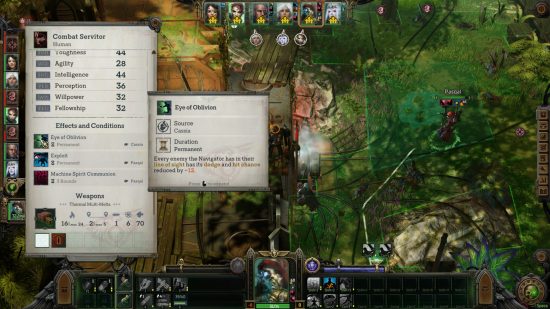
It isn’t until halfway through the lengthy second chapter that Rogue Trader begins to fall apart like a Voidship under heavy fire from two angles: bugs and tedious auxiliary mechanics. The first major issue arises when a talent that grants my protagonist an extra turn breaks, making her the only character – including enemies – that can act in combat. Instead of reloading an earlier save and respeccing my character to remove said talent, I destroy a troublesome gang as they’re powerless to stop me. I respec afterwards, but a couple hours of playtime later I realize I somehow broke a companion quest in cheesing the mission. I can no longer help Argenta, a dogmatic Soldier, face the demons of her past.
Irked, I continue on with the main story. Tasked with reestablishing a connection with each of the three von Valancius colony worlds, I have to warp between star systems. The routes are color-coded: green signals a safe passage, yellow and orange denote degrees of danger, and red all but guarantees a catastrophe during travel.
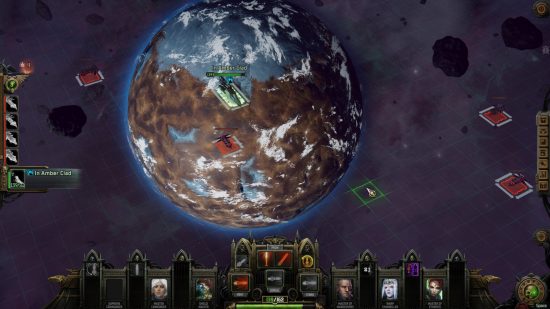
I don’t know where any of these colony worlds are; I find the Koronus Expanse map frustrating to unravel, triggering random events as I warp from star system to star system looking for my protectorate. These events pull me back into my Voidship to fend off zombie hordes or invading warp demons. One such instance freezes the game every time I fire upon a grotesque poison creature, even after a reload. I jump back to a much earlier save, losing an hour of progress and triggering more random events before I find where I need to go.
This part of the game also introduces Voidship battles and colony management. The latter is unobtrusive, offering resources and powerful items for scanning planets and building up the destroyed worlds under my care. Voidship battles, however, are often unavoidable. These turn-based bouts consist of chasing enemy ships on a grid-based field with awkward movement and attack ranges. I dread them because I adore ground combat and want to get back to it as quickly as possible.
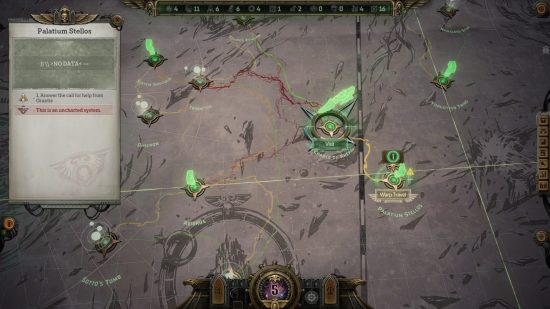
While I primarily stick with the normal difficulty, Rogue Trader has a staggering amount of modular difficulty options, including an option to drop Voidship battles down to easy, which I pick in the hope of speeding them along. Furthermore, there are quite a lot of odd difficulty spikes with skill checks: in one area, I have a 90% chance to hack a computer as my Tech-Priest companion has a high Tech Use stat; however, in the next area – all within the same chapter – his Tech Use chance drops to 2%. Luckily, I can edit the difficulty of skill checks as well, but I’m also annoyed that I have to balance such things myself to keep Rogue Trader feeling somewhat fair.
If I wasn’t reviewing the game, I would have stopped there and waited for a handful of bug and balance patches before continuing my adventure through the Koronus Expanse. But I press on, entering the third and best chapter of the game. This middle chapter strips away all these auxiliary mechanics, boiling the game down to a single location that features only dialogue, exploration, and combat. Without spoiling what occurs, this section engrosses me as I piece my party back together and explore an area rife with danger and betrayal that’s free of (most) bugs. Unlike all other areas of the game, which consist of not much more than a handful of maps to do battle in with maybe a dialogue-based puzzle or two to solve, exploration here feels meaningful as I scavenge for items. But once the chapter wraps up, it’s back out into the Koronus Expanse, praying I don’t trigger another random event or Voidship battle as I continue to the main scenario.
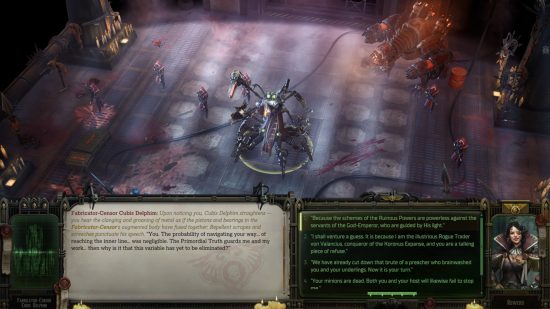
By this point, I’m invested in several of my companions’ stories: Yrliet’s quest to uncover what happened to the rest of her people, and the mysterious Omnissiah prophecies surrounding my Tech-Priest buddy Pasqal, interest me in particular. Plot threads from earlier events also start to entwine and wrap up. It seems like a lot of my choices trigger specific consequences, but it would take several playthroughs of this lengthy adventure to see the effects of them all. While I enjoy my companions, the overarching narrative of an evil entity from another dimension has long since lost me. Luckily, when Rogue Trader isn’t forcing me to reload when an enemy gets stuck in an unreachable area, the fluid combat never grows stale even as I approach 100 hours of playtime.
Much like the devout’s blind faith in the God Emperor, I have hope that Owlcat Games will eventually release a handful of patches that elevate Rogue Trader into the ranks of the best modern CRPGs, given its track record with the Pathfinder games. That said, I can’t strongly recommend Rogue Trader in its current state. I want to revisit it in a year or so to truly appreciate the great character creation, memorable companions, intriguing Warhammer lore, and deep combat – maybe with an option to skip Voidship battles, please and thank you.
Our sister site Wargamer also has all of the Warhammer 40k factions information you need, as well as extensive coverage of all things Space Marines and beyond.
